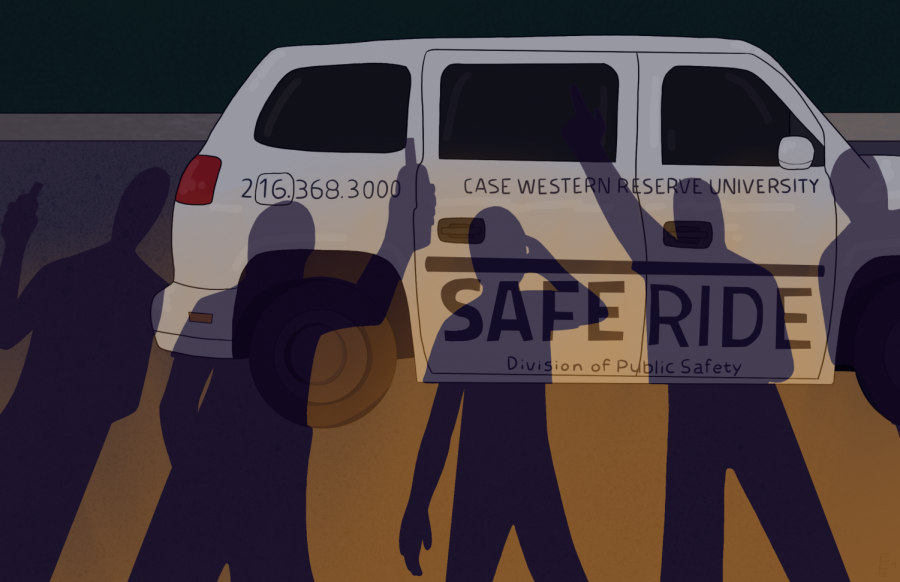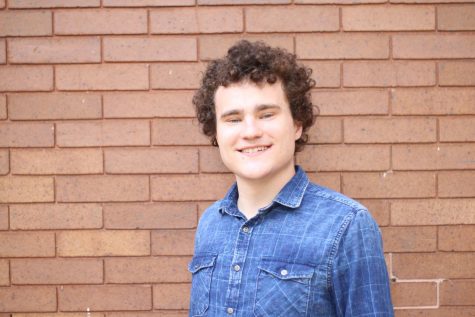SPR asks for clear publicly available Safe Ride Policy
November 15, 2019
Safe Rides are a constant presence on campus, shepherding students across campus when they feel unsafe walking for any reason. However, due to reports of students not being allowed in Safe Rides because of intoxication, many are concerned that Safe Rides are failing in their duty to keep students from walking in dangerous areas on cold nights. On Thursday, Nov. 7, the Student Presidents’ Roundtable (SPR) drafted a letter to the Case Western Reserve University Executive Director of Public Safety Frank Demes, to ask the administration to address the concerns.
The letter, written in collaboration with the Undergraduate Student Government (USG) and Residence Hall Association (RHA) Executive Committees, hopes to increase transparency. While trying to draft the letter, SPR was faced with how little information is available about Safe Ride’s policy involving drunk students. Each member of SPR spent half an hour searching for the policy online, yet no one was able to find anything. For Holly Sirk, President of Panhellenic Council, not having a policy accessible to students is as good as not having one.
The first step for SPR is getting these policies written out.
“The big problem is that we’re trying to change policy when we’re not even aware of what the policy is,” said SPR secretary Arland Zatania Lojo.
A main point of debate was around the policy’s definition of an intoxicated student who would be denied service. If drivers have complete discretion over what the definition of drunk is, then a student’s status is going to depend entirely on the individual driver instead of a systematic approach.
This leads into the intentions behind Safe Ride’s policy. Are drivers refusing students because they believe they will vomit in the car or because they believe the students need medical intention? Marin Exler, USG president, is concerned that the policy, when left up to the drivers discretion, is not in favor of the safety of the student.
“Are we making sure students are safe or are we making sure we are not spending money on cleaning Safe Rides because of vomiting?” said Exler.
Without a clear policy outlining Safe Ride’s definition of intoxication, Exler’s question is impossible to answer.
Sirk is looking for a written policy to address concerns around training. The Greek community has many quick reference guides that give concrete signs of when students should call emergency medical services (EMS), and similar guides could be used for Safe Ride drivers. For Sirk, training on levels of dangerous intoxication is key to ensuring that drivers consider the safety of students they deny service to and call EMS.
“Training does not take long,” said Sirk. “You can get a lot of good information in a half hour, hour.”
If this training was included in the policies, there would be at least some level of uniformity among drivers.
Another concern is about what happens when Safe Ride calls EMS. During the meeting, a volley of rhetorical questions were asked around the table: Does the driver have to wait with the student? Will this significantly delay Safe Ride times? Primarily, will police be called with EMS?
Demes provided an answer to The Observer after the meeting, saying drunk students are allowed to take Safe Rides. If the student is having difficulty walking, is vomiting or is incoherent, the driver will radio a CWRU security officer to assist them. In most cases, EMS will be asked to provide medical care.
Many students feel unsafe around law enforcement, so Safe Ride drivers calling for EMS or CWRU police when they suspect their passengers are intoxicated could lead to students avoiding the free service.
“I honestly feel very unsafe around police just in general,” said University Program Board (UPB) president Atirola Omilabu in the meeting.
Omilabu is not alone in feeling unsafe around campus police.
“I was talking to a student who was a DACA [Deferred Action for Childhood Arrivals] recipient and she was at a party that the cops got called on, and she was terrified because even if Case police are not going to hurt you, there is a general threat,” said Exler.
Omilabu pointed out that alternatives to Safe Ride, such as Uber, create a cost barrier for students who need safe transportation, especially because Uber charges a fee if a rider pukes in a vehicle.
“If we’re asking drunk people to not take a Safe Ride and just call an Uber, not everyone is in the financial situation to pay $250 if they do puke,” said Omilabu.
Outside of the status of drunk students, SPR discussed how more Safe Rides might be necessary during the winter months since the campus becomes less walkable as temperatures drop.
Exler sent the letter to CWRU head of security Demes on Nov. 12. By press time they had not yet received a response.




